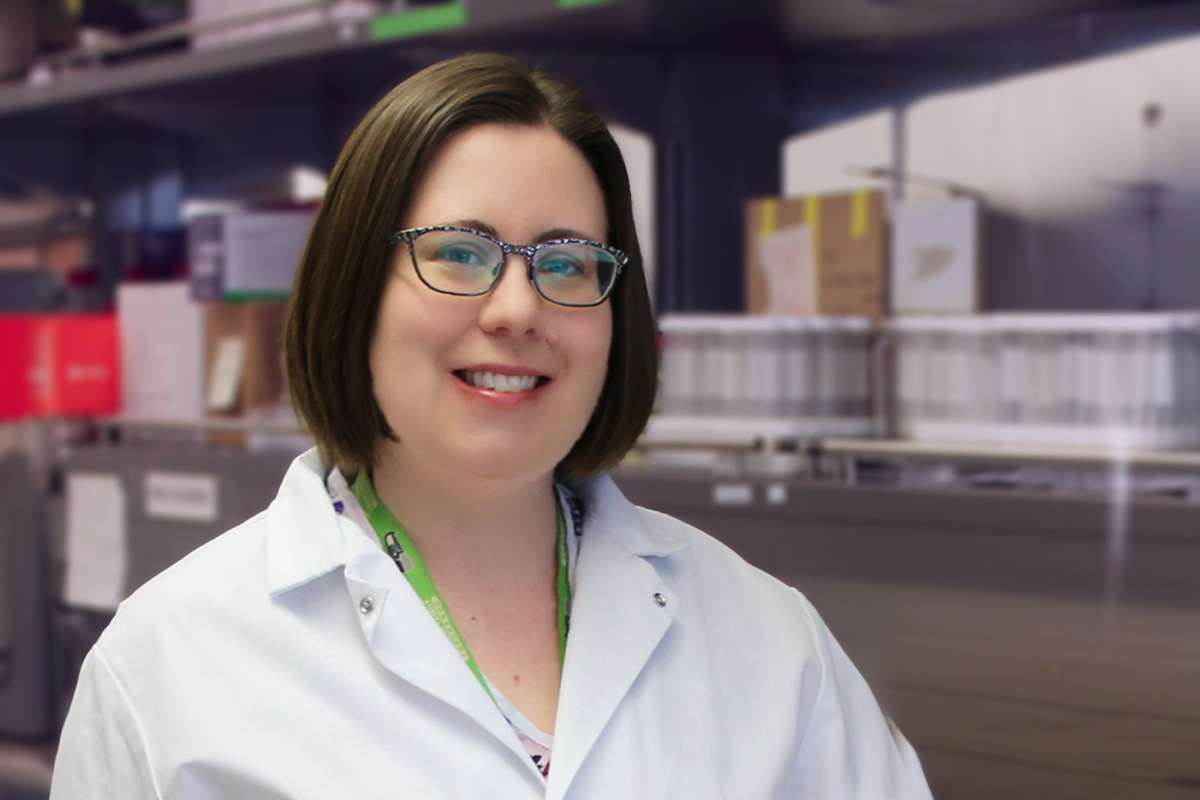
Immunologist honoured for best paper of the year
Dr. Deanna Santer, assistant professor of immunology at the Max Rady College of Medicine and the GSK Research Chair in immunobiology of infectious diseases at the University of Manitoba, has been awarded a 2023 Rosalind Franklin Society Award in Science this month.
The Rosalind Franklin Society, in partnership with Mary Ann Liebert, Inc. publishers, launched these prestigious annual awards for the best paper by a woman senior author or under-represented minority in science in each of the publisher’s more than 100 peer-reviewed journals to highlight the important contributions of these scientists and provide role models and mentors for younger scientists following in their footsteps.
Santer has led groundbreaking research on immune proteins called interferon-lambdas (IFN-lambdas) and recently secured a Manitoba Medical Service Foundation grant and $250,000 New Frontiers in Research Fund grant to study gut immune mechanisms and develop new treatments for gastrointestinal diseases, showcasing her innovative approach to medical research.
Beyond her research, Santer, who earned a PhD at the University of Washington and completed postdoctoral work under Nobel laureate Dr. Michael Houghton at the University of Alberta, has actively mentored young women in STEM for the past 14 years and is part of the executive team of WISDOM.
UM Today asked Santer to reflect on her career, research and vision for the future.
What does winning a Rosalind Franklin Society Special Award in Science mean to you and how do you think it will impact your future work?
I am very honoured to have received this award knowing it meant our contribution was recognized as the top paper in the Journal of Interferon and Cytokine Research for 2023. The Rosalind Franklin Society does amazing work showcasing and supporting women in science inspired by the pioneering work of Dr. Rosalind Franklin -that was overlooked. The eventual Nobel Prize for discovering the DNA double helix was given to Drs. James Watson and Francis Crick (without any credit to Franklin). This award is also much appreciated because I started my lab during a challenging time of the pandemic. The team worked very hard leading to this study as my first publication as senior author.
Tell us about the award-winning paper. What was innovative or novel about it?
The publication was a big step forward in the IFN-lambda field because we were able to finally find and characterize new antibodies that could measure the IFN-lambda receptor after its discovery 20 years earlier. This was a team effort with collaborators in Australia and the United States to ensure the robustness of the findings. We are now using these antibodies in multiple projects to uncover in which health conditions or infections we should be promoting IFN-lambda activity.
Can you share a particularly memorable moment or breakthrough from your research career that has had a lasting impact on you?
Knowing you are the first person to see a result and then sharing that with your colleagues and eventually the world is exciting. I try to share this with my trainees that sometimes the fundamental science findings that are not always expected will lead to important discoveries that could impact human health in the future.
How do you envision the future of immunology research, especially in the context of emerging infectious diseases?
I am biased after studying immunology for over 15 years, but immunology is so fascinating for how our immune system has evolved to tackle many types of challenges. We are finding out more and more how we can block or enhance specific parts of our immune system which has led to many new groundbreaking treatments. My lab contributed to the testing of IFN-lambdas as a potential treatment for mild COVID-19, and we believe these proteins, with fewer side effects than other antiviral proteins, are worth considering as treatments against other viruses.
What advice would you give to young women and underrepresented minorities who are aspiring to pursue careers in science, especially in fields like immunology?
I didn’t grow up with anyone in my family in science or academia, so I encourage young people in general to not be afraid to reach out to mentors to find new opportunities. It is OK, early on, to not know exactly what your future career will be, but getting experience as a summer job in the lab is the perfect way to see if a research career is right for you. Don’t be afraid to be selective of the lab you choose, too, as you need to find a supportive environment that will help you achieve your end goals. Lastly, network whenever you can! This is actually how this publication came about; I networked at a conference after I gave a talk which brought our groups together.
Looking ahead, what are your long-term goals for your research and your role in advancing the field of immunology?
Our team has multiple, exciting human immunology projects on the go related to antiviral immunity and immune regulation, with the ultimate goal of discovering ways to promote optimal immune responses to benefit patients. I am lucky to work within the department of immunology here in the Rady Faculty of Health Sciences with so many experts nearby and enthusiastic staff and students. I am continuing to build my IFN-lambda network around the world. There is still so much to discover: this family of immune proteins is quite young compared to other interferons discovered over 50 years ago.






